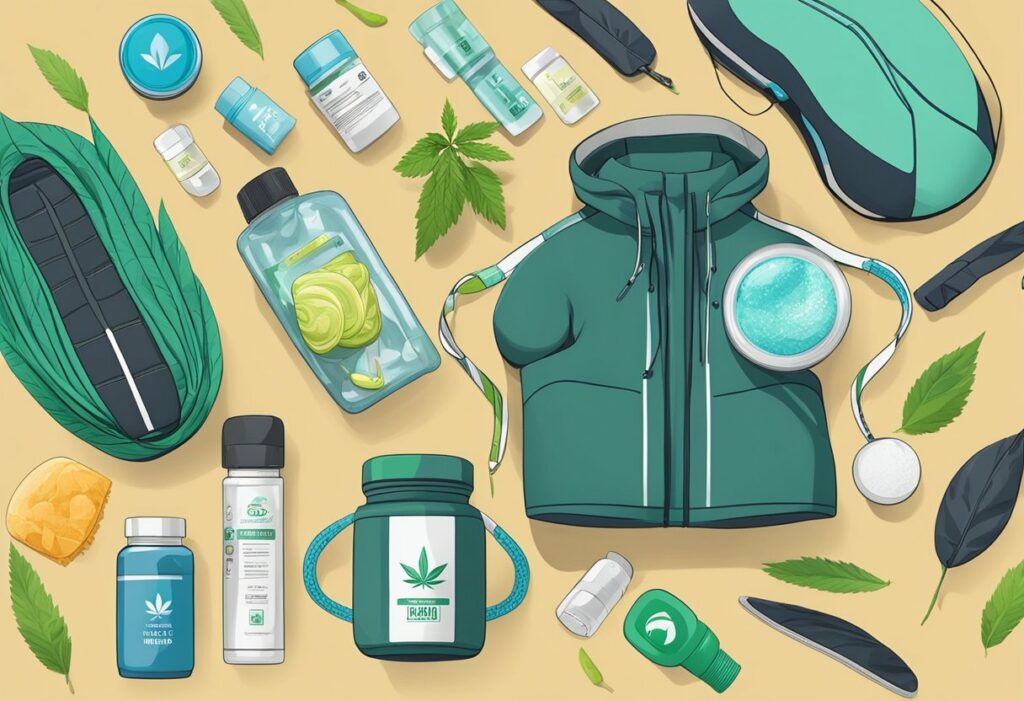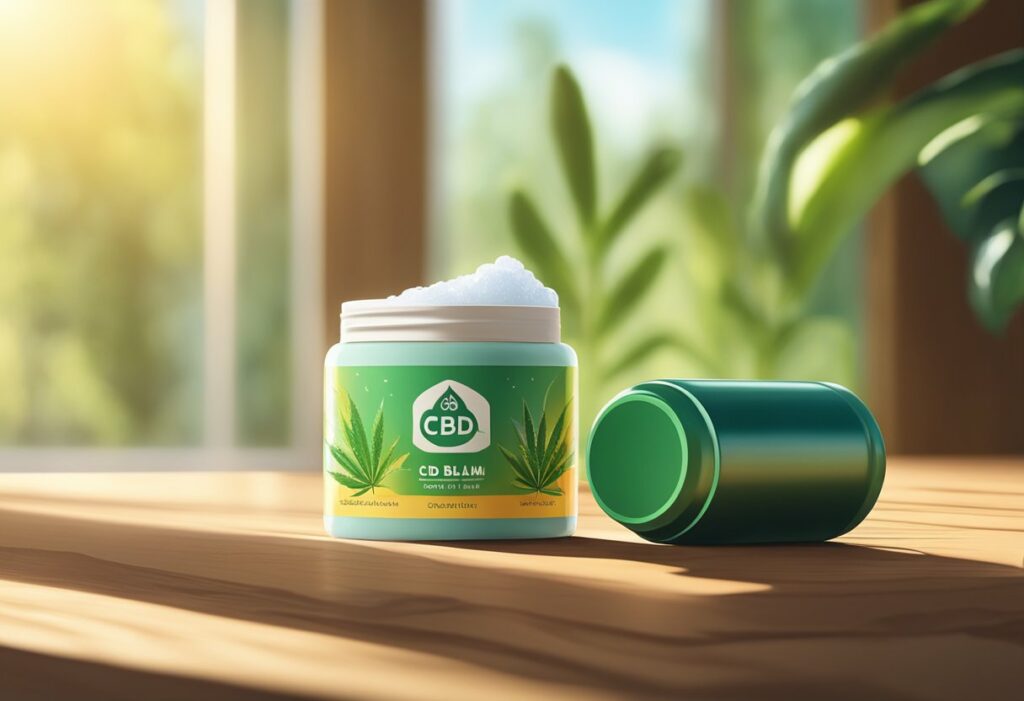Cannabidiol, most commonly known as CBD, has made significant strides in the wellness sector, emerging as a popular supplement for health enthusiasts and athletes alike. Derived from the cannabis plant, CBD is reputed for its ability to assist with various health concerns, but recently, its role in muscle recovery has garnered particular attention. Without the psychoactive effects associated with its cousin compound THC, CBD offers an appealing alternative for those seeking natural recovery solutions after intense physical activity.
The process of muscle recovery is critical for athletes, as it not only involves the repair of muscle fibers but also impacts performance and fitness progression. While traditional methods like proper nutrition, rest, and active recovery remain fundamental, the integration of CBD into recovery protocols is being explored for its potential anti-inflammatory and pain-relieving properties. Studies suggest there may be merit to CBD’s effectiveness in this area, with users reporting a perceived reduction in muscle soreness and improved recovery times. With ongoing research, the applications of CBD in sports recovery continue to be scrutinized, evaluating its potential as a legitimate aid in an athlete’s recovery arsenal.
Key Takeaways
- CBD is considered for its potential benefits in muscle recovery due to its anti-inflammatory properties.
- Recovery is crucial for athletic performance, and CBD is being integrated into recovery plans.
- Ongoing research is necessary to fully understand the effectiveness of CBD in sports recovery.
Understanding Muscle Recovery
Effective muscle recovery is crucial for athletes and individuals engaged in regular exercise, as it allows muscles to repair, rebuild, and strengthen after the stress of workouts. The mechanisms behind recovery are complex, involving both biological processes and the role of the endocannabinoid system in maintaining homeostasis and managing muscle soreness.
Role of the Endocannabinoid System
The endocannabinoid system (ECS) is a network of receptors, enzymes, and molecules, such as endocannabinoids, that play a pivotal role in maintaining the body’s homeostasis. Notably, ECS is involved in reducing inflammation and pain, which can contribute to improved post-workout recovery. Studies have indicated that the modulation of ECS could influence the recovery process, managing how one experiences muscle soreness and the inflammation response after exercise.
Muscle Recovery Fundamentals
Muscle recovery encompasses a variety of processes activated in response to exercise-induced muscle damage. Post-exercise, the body initiates repair on microscopic tears in muscle fibers, leading to muscle soreness, commonly referred to as delayed onset muscle soreness (DOMS). Recovery ensures the restoration of muscles to pre-exercise states, prep for subsequent workouts, and the alleviation of DOMS. Processes include the removal of metabolic byproducts, muscle protein synthesis, and the restoration of energy reserves.

The Science of CBD
The exploration of cannabidiol (CBD) in the realm of sports medicine has shed light on its potential anti-inflammatory effects and its distinctive mechanisms apart from its well-known counterpart, tetrahydrocannabinol (THC).
Cannabidiol and Inflammation
Cannabidiol is recognized for its anti-inflammatory properties within the scientific community. Unlike THC, CBD does not produce a psychoactive effect and instead works by interacting with the endocannabinoid system (ECS) to bring about an anti-inflammatory response. Cannabinoid receptors found in the body, such as CB1 and CB2, are involved in the modulation of pain and inflammation. Research posits that CBD’s engagement with these receptors contributes to its ability to aid in muscle recovery by reducing inflammation.
Research on CBD and Muscle Recovery
Several studies have investigated the effects of CBD on muscle recovery. These investigations reveal that CBD may enhance recovery through its influence on muscle damage and reduction in pain. A notable review titled “Potential role of cannabidiol on sports recovery: a narrative review” discusses the scientific evidence around the potential benefits of CBD for athletes. More empirical work is needed to fully understand CBD’s recovery-mediating properties.
CBD vs THC: Comparing Cannabinoids
- CBD (Cannabidiol)
- Non-psychoactive
- Anti-inflammatory, pain-reducing qualities
- Interacts with ECS without the “high”
- Potential neuroprotective benefits
- Legal status varies by region; generally more accepted
- THC (Tetrahydrocannabinol)
- Psychoactive cannabinoid
- Pain relief associated with the “high”
- Stronger binding to CB1 receptors
- Legality more restricted compared to CBD
- Could cause undesired effects in a sports context
CBD distinguishes itself from THC through its lack of intoxicating effects and its targeted interaction with the ECS, which may contribute to muscle recovery without the drawbacks associated with THC.
Benefits of CBD for Athletes
Cannabidiol (CBD) has been gaining attention for its use in sports, particularly regarding pain management and recovery processes. Athletes from various disciplines are exploring how CBD may assist in enhancing performance and facilitating faster post-exercise recovery.
Pain Relief and Management
Many athletes turn to CBD for its potential to mitigate pain, which can be a consequence of high-intensity training. Research suggests a link between CBD use and reduced inflammation, which could be beneficial in pain relief. When athletes incorporate CBD into their recovery regimen, they may experience a decrease in the discomfort associated with intense physical activity.
CBD for Post-Workout Soreness
Post-workout muscle soreness can hinder an athlete’s training and performance. CBD’s anti-inflammatory properties are thought to help in reducing muscle soreness after strenuous workouts. By alleviating symptoms of delayed onset muscle soreness (DOMS), CBD may support athletes in maintaining a consistent training schedule.
CBD’s Potential in Fitness and Growth
For athletes focused on fitness and growth, CBD presents a promising avenue for exploration. While definitive research is ongoing, there is an indication that CBD might play a role in muscle metabolism and tissue regeneration. Utilizing CBD may offer potential advantages in muscle recovery, which is crucial in strength training and overall athletic development.

Types of CBD Products for Muscle Recovery
CBD products designed for muscle recovery can complement fitness regimens, offering support in post-workout recuperation. They come in various forms tailored for different preferences and lifestyles.
CBD Oil and Tinctures
CBD oil, often consumed in the form of tinctures, is a popular choice for systemic relief and post-workout recovery. To use, one typically places drops of the oil under the tongue, allowing for rapid absorption into the bloodstream. These tinctures are favored for their ease of dose adjustment and relatively fast-acting effects.
Topicals: Creams, Balms, and Gels
For localized relief, topical applications such as creams, balms, and gels are widely preferred. These products are applied directly to the skin over sore muscles, where they can interact with local receptors. CBD topicals like a CBD balm or lotion incorporate other soothing ingredients and can be massaged into the skin to aid with muscle recovery.
Edibles: Capsules and Gummies
Alternatively, edibles such as capsules and gummies provide a more convenient and discreet method of intake. Capsules are straightforward and offer a no-mess, precise dosage, while gummies add a tasteful experience to CBD consumption. As an oral supplement, these edibles are ingested, leading to a slower onset but longer-lasting effect, which can be beneficial for extended muscle recovery support.
Safe Usage of CBD for Recovery
When considering CBD for muscle recovery, it’s crucial for individuals to focus on finding the right dosage and understanding product labels. Awareness of potential side effects and contraindications also plays a key role in safe usage.
Determining Correct Dosage
The appropriate dose of CBD can vary widely depending on factors such as body weight, the extent of discomfort, and personal body chemistry. It’s important to start with a low dose and gradually increase it while monitoring effects. For instance, a narrative review suggests that beginning dose adjustments and monitoring individual responses can contribute to effectively finding a suitable dosage for recovery purposes.
Understanding Labels and Potency
To ensure safety and efficacy, one should carefully read labels to understand the potency of CBD, which is often denoted in milligrams. Labels should also be checked for the type of carrier oil used, as carrier oils can affect absorption. Products may come in various forms, including oils and topical creams, and the potency can influence the outcome of the recovery regimen.
Side Effects and Contraindications
Although CBD is generally considered safe, potential side effects include fatigue, changes in appetite, and gastrointestinal issues. Individuals should also consider any contraindications with other medications they are taking. It’s advisable to consult with a healthcare provider before beginning any new supplement regime, particularly with substances like CBD that are still subject to ongoing study, as research such as one on skeletal muscle regeneration indicates ongoing exploration into its effects and tolerability.
Regulatory Status of CBD in Sports
The inclusion of CBD in the context of sports has been a topic of evolving regulatory discussion, especially as it pertains to athlete recovery and performance. Both the World Anti-Doping Agency and federal legislations have played roles in shaping the current landscape.
CBD and the World Anti-Doping Agency
In 2018, the World Anti-Doping Agency (WADA) removed cannabidiol (CBD) from its list of prohibited substances. This decision paved the way for professional athletes to use CBD, as long as it is free from tetrahydrocannabinol (THC), the psychoactive component of cannabis sativa. THC remains on the prohibited list, implicating procedures for ensuring pure, THC-free CBD products. The National Football League (NFL) conforms to these regulations, thereby permitting players to utilize hemp-derived CBD for recovery purposes, with caution towards purity standards to avoid positive tests for THC.
Legality of Hemp-Derived CBD
Hemp, defined as a cannabis sativa plant containing less than 0.3% THC, is legally distinguishable from marijuana. The Agricultural Improvement Act of 2018, commonly known as the 2018 Farm Bill, federally legalized the production of industrial hemp. Consequently, hemp-derived CBD products adhering to the THC threshold are legal for use, including within the sport sector. Regulation of these products, however, remains inconsistent. Professional athletes are advised to seek products with third-party testing to ensure compliance with sports governing bodies and federal law.
Beyond Muscle Recovery
While the benefits of CBD for muscle recovery are well-recognized, its potential impacts extend into other realms of health and wellness. CBD’s implications in general wellness and its effects on sleep quality and relaxation are notable areas of interest, supporting the body’s overall homeostasis.
CBD’s Role in General Wellness
CBD interacts with the body’s endocannabinoid system (ECS), which is vital for maintaining homeostasis—the body’s balanced state. This interaction can affect various wellness areas, such as mood regulation, immune system responses, and pain perception. Studies suggest that CBD might play a role in supporting overall health and wellness by potentially reducing inflammation and oxidative stress.
Effects on Sleep Quality and Relaxation
CBD has been researched for its potential as a sleep aid. It may help in improving sleep quality by exerting a calming effect on the nervous system, which can be beneficial for individuals who experience sleep disruptions or insomnia. Evidence points to CBD’s ability to promote relaxation, which can lead to more restful and uninterrupted sleep, ultimately contributing to better health.

Personalizing CBD for Optimal Recovery
To enhance muscle recovery and optimize fitness results, it is essential to tailor CBD usage to individual exercise routines and recovery needs. Understanding how to adjust CBD intake and combine it with proven recovery techniques can significantly benefit post-workout regeneration.
Customizing CBD Intake Based on Physical Activity
There is a growing body of research indicating that the efficacy of CBD can vary considerably based on an individual’s physical activity level. For instance, a study highlighted in Frontiers in Pharmacology outlines the potential benefits of CBD in sports performance and recovery. Athletes engaged in intense training may require higher doses of CBD to manage inflammation and aid muscle repair, whereas recreational fitness enthusiasts might benefit from a smaller, more targeted dosage. Personalizing CBD dosing is fundamental to maximizing its recovery properties, taking into account factors such as:
- Body Weight: Heavier individuals may need higher doses
- Intensity of Workout: More strenuous workouts may necessitate increased CBD
- Tolerance Level: Incremental adjustments depending on individual response
Combining CBD with Other Recovery Techniques
To further enhance recovery post-exercise, one should consider using CBD in conjunction with other recovery techniques. Strategies such as active recovery, adequate protein intake, and hydration are critical components for muscle repair. An example of integrating CBD into a recovery protocol could involve taking a CBD product following a balanced post-workout meal rich in protein to support muscle synthesis. Additionally, combining CBD with:
- Active Rest: Low-intensity movements to increase blood flow and reduce soreness
- Sleep: Ensuring quality sleep cycles for optimal recovery
- Stretching: Incorporating flexibility exercises post-CBD ingestion to alleviate muscle tension
By thoughtfully incorporating CBD into a comprehensive recovery regimen tailored to one’s specific fitness goals, it’s possible to significantly improve the post-workout recovery process.
Emerging Trends in CBD and Recovery
Recent studies indicate that cannabidiol (CBD) may influence muscle recovery following intensive training. As interest in this area grows, various trends underscore the innovation in using CBD to support recovery processes.
One emerging trend is the supplementation of CBD after resistance training. There’s exploratory research suggesting that CBD could play a role in aiding muscle regeneration. While definitive data is scarce, ongoing studies seek to build a stronger case for CBD as a supplemental aid for recovery times following workouts.
Another development is the combination of CBD with other compounds. For instance, products are being created to support recovery from muscle soreness that blend CBD with cannabigerol (CBG), but research into their efficacy is still preliminary. Manufacturers are innovating by including various other commercial compounds known for their recovery benefits in these products.
The narrative around CBD’s role in sports recovery is also gaining traction. With an aim to establish clinical guidance, researchers are reviewing CBD’s potential to reduce fatigue and muscle damage, although conclusive evidence remains elusive at present.
Future trends may likely focus on the safety and tolerability of CBD products, as this area of concern is critical for its acceptance and use in sports and wellness. The effectiveness and regulatory approval of CBD-infused recovery aides are also anticipated to be key factors influencing its growth in the market.
In the scope of athletic performance, the conversation around CBD is becoming more nuanced. There is an ongoing discussion regarding the potential impact of CBD on exercise performance and substance distinction during athletic competitions.
These trends reflect a fast-evolving domain where CBD’s role in recovery continues to be a subject of scientific and commercial interest. As new products and research emerge, the narrative around CBD in muscle recovery will likely become more pronounced and clear-cut.
Practical Tips for Implementing CBD in Recovery Routines
For athletes and fitness enthusiasts looking to enhance their recovery, integrating cannabidiol (CBD) into their post-workout routine can offer several benefits. This section provides specific instructions on how to incorporate CBD into a post-exercise regimen and advice on selecting the appropriate form of CBD product to suit individual needs.
Incorporating CBD into Post-Workout Regimen
- Dosage and Timing: Optimal CBD dosage may vary based on individual factors but starting with a low dose and gradually increasing as needed can be an effective approach. It’s recommended to use CBD soon after a workout, as it may assist with muscle recovery.
- Application Method: For targeted relief, topical CBD creams can be applied directly to muscles that are sore post-exercise. In contrast, systemic effects can be achieved through oral forms such as tinctures or capsules.
Choosing the Right Product Form
- Quality and Purity: When selecting a CBD product for muscle recovery, ensure that it is of high quality and free from contaminants by checking for third-party lab results.
- Product Type: Different product forms such as oils, creams, or edibles may be more suited to individuals based on their preference and the desired outcome.
Exercise enthusiasts should remember that while CBD has potential benefits, its effects can vary. It’s crucial to consult with a healthcare professional before starting any new supplement, including CBD.
Comparative Analysis of CBD with Alternative Muscle Recovery Aids
In evaluating the effectiveness of cannabidiol (CBD) for muscle recovery, it’s imperative to compare its properties and outcomes with those of traditional muscle recovery aids.
CBD vs Traditional Pain Relievers
Cannabidiol (CBD) has been gaining attention as a potential muscle recovery aid that might offer benefits over traditional pain relievers. Unlike common analgesics, such as ibuprofen and acetaminophen, CBD does not exhibit the same level of potentially adverse effects on the gastrointestinal tract or the cardiovascular system. Furthermore, evidence suggests that CBD might lower inflammation and alleviate pain—key aspects of muscle recovery. For instance, a study aimed at discovering if CBD could expedite recovery post-exercise found that CBD has been purported to aid in this process.
When considering traditional pain relievers, it’s important to note that they operate by reducing inflammation and mitigating pain, thereby easing the post-exercise recovery. However, these analgesics often come with warnings of potential side effects with long-term use, which can include gastrointestinal complications and other systemic effects.
Analyzing Different Recovery Supplements
In the realm of recovery supplements, CBD is viewed alongside products such as protein powders, BCAAs (branched-chain amino acids), and omega-3 supplements, all of which are revered for their support in muscle repair and recovery. Unlike these supplements that directly support muscle protein synthesis and repair, CBD’s role is more aligned with reducing soreness and inflammation, potentially facilitating a faster return to training. For example, studies analyzing the effects of CBD oil on perceived muscle soreness and performance post-exercise indicate that CBD may help as a recovery aid after muscle damage (Effects of Cannabidiol Oil).
Supplements like protein and BCAAs work synergistically with the body’s muscle-building mechanisms, which are crucial for recovery, especially after strength training. Conversely, CBD is proposed to indirectly support the recovery process by moderating inflammation and discomfort, rather than directly influencing muscle protein synthesis.
The landscape of muscle recovery supplements is diverse, and the role of CBD within it is still being studied. Individuals interested in integrating CBD into their recovery regimen should thoroughly assess its comparative benefits alongside established supplements in aiding recovery.
Frequently Asked Questions
This section addresses common inquiries about CBD’s role in muscle recovery, providing concise and informed responses based on current research and understanding.
How does CBD affect muscle recovery after exercise?
CBD may support muscle recovery by reducing inflammation and soreness post-exercise. Research suggests that CBD leads to lower ratings of soreness from 48 to 72 hours following an intense workout.
What are the benefits of using CBD for post-workout inflammation?
Using CBD after workouts may help reduce inflammation, which is a key contributor to muscle soreness and prolonged recovery time. Studies have shown that CBD can help dampen the inflammatory response following exercise.
Can CBD oil speed up the recovery from muscle strains?
CBD oil, when applied to muscle strains, might facilitate a faster recovery by possibly improving satellite cell differentiation in muscles, which is crucial for muscle repair and regeneration.
What types of CBD products are most effective for muscle recovery?
Topical CBD creams and ingestible oils or powders are widely used for muscle recovery. The choice of product may depend on personal preferences and the specific nature of the muscle injury or soreness.
Are there any side effects of using CBD for muscle recovery?
While CBD is generally considered safe, potential side effects may include fatigue, changes in appetite, or gastrointestinal issues. It is also important to ensure that CBD products do not contain prohibited substances, especially for professional athletes.
How do CBD dosages vary for muscle recovery purposes?
Dosages can vary widely; however, some studies point to 60 mg of CBD for recovery improvements. More research is needed to determine optimal dosing for muscle recovery effects.
Last Updated on March 9, 2024 by Megan Mbengue, BSN, RN, CHPN


